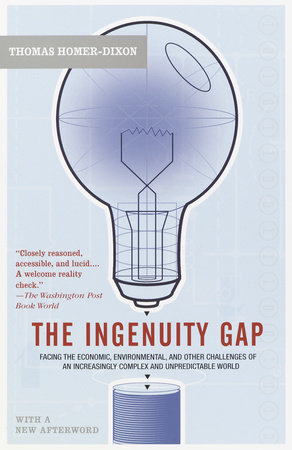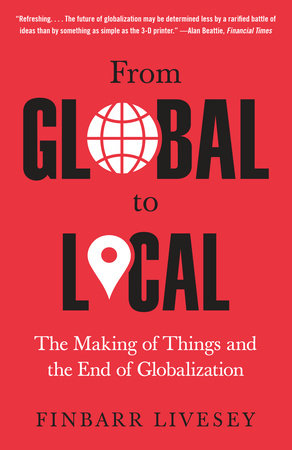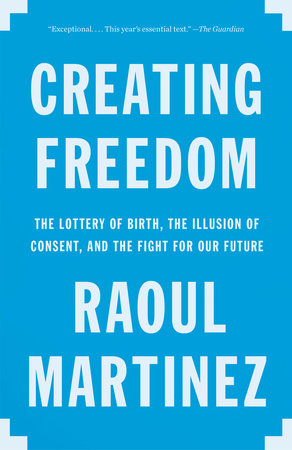Interview with Thomas Homer-Dixon, from READ magazine
Q. In the book, you discuss technological ingenuity and social ingenuity. What are the differences and how do they complement each other in our efforts to keep pace with the challenges that we face?
A. Technical ingenuity is about technical solutions to the problems we face. It encompasses everything from new grains that can grow in eroded soil, to water and energy conservation technologies. Any time we think about a problem and we’re thinking about a technical fix for it, we’re thinking about technical ingenuity. Social ingenuity consists of ideas for how we structure our society and our institutions, such as government, court systems, and markets. In essence, these are ideas for how we arrange our social relations among ourselves. Good institutions are critically important for generating prosperity, as well as political and social stability. They help create a humane society. The social ingenuity that goes into these institutions and the ideas that lie behind them are ultimately more important than the ideas that go into new technologies. You don’t get new technology unless you have a well-functioning structure of social institutions in place.
Q. Do you think that the "experts," in their efforts to solve problems, sometimes lose sight of the delicate balance that exists between man and the environment, and as result, in trying to create solutions, actually create new problems?
A. There has been a tendency, although I think this has started to change in the last two decades or so, to think of Earth’s environment and its ecosystems as being very resilient to human inputs — and human insults. We’re now starting to understand that sometimes they’re resilient, and sometimes they aren’t. Frequently, these systems can be described by what specialists call non-linearities — sudden changes in their behaviour. They can flip from one mode to another. A climate system can be benign at one point and then flip into a state characterized by drought or heavy storms. Biosystems, such as forests, can suddenly change their character. A blight or pest can sweep through, in a relatively short period of time, and dramatically change the ecosystem’s whole arrangement of species. I think that an understanding of the non-linear nature of our environment and ecosystems is becoming more widespread. We must have prudence in dealing with our natural world. Once we realize that we don’t know where the thresholds — or cliffs — are in our dealings with these ecosystems, we should step back a bit and try to reduce our pressure on them.
Q. In the west, we seem far too focused on economic success. Statistics like GNP and GDP are the barometers we use to measure how well we are doing, yet the numbers ignore so many intangibles that contribute to an overall quality of life. Do we have to change our thinking about what constitutes successful growth?
A. In a purely technical sense, we have to rethink how we measure wealth and economic growth. We have this crazy situation right now where efforts to control pollution and fix environmental damage actually turn up as positive entries in a country’s GDP statistics. If a country ruins its forests, or silts up its waterways, the damage doesn’t turn up as a negative thing in its economic accounts. Instead, all the dredging to clear its waterways, for example, is added as a positive line item to its GDP accounts, which suggests that you can actually increase economic growth by destroying your environment. That’s crazy. But your question is more general than that. It seems to me, fundamentally, that the problem of The Ingenuity Gap resides at the level of values. We have to re-think what we value as the "good life" and what things we feel are important to us as part of our day-to-day well being. If we insist on having SUVs, large houses with five bedrooms, and Caribbean vacations, it’s not clear that the world’s ecosystem can support the strain that such a lifestyle places on it — especially if all the ten billion people who will eventually live on Earth have the same lifestyle. We need to separate the ingenuity gap problem into two parts. First, there is the rising requirement for ingenuity, for solutions to our problems; and second, there is the sometimes inadequate supply of these solutions. One of the things that’s driving up our requirement for ingenuity is the set of values that define what we think is the good life. If we want materially-intensive lives, with lots of things in them — from big cars and house to vacation trips to faraway places — then our ingenuity requirement is going to be much higher than it would be otherwise.
Q. Do you think that the increasing complexity of the world has affected the quality of our political leadership?
A. We often hear the remark that our current leaders don’t seem to match the calibre of leaders from previous generations. We often see headlines in the press asking: "Where Have All The Leaders Gone?" This question is particularly germane right now with an American election on the horizon. My sense is that it’s not the calibre of our leaders that has fallen. We probably have leaders who are just as smart and just as well-motivated (or not) as in any period in the past. The real problem is that our world has become so much more complex that our leaders look inadequate as a result of the extraordinary problems they are trying to solve, or at least manage. They become more like functionaries rather than the initiators of visionary new policies or proposals. We end up with leaders who do nothing more than incrementally tinker with our political, economic, and technological systems, because that is all that seems feasible. There are several reasons for this. First, the complexity of our problems is so great that it is very difficult to understand what policies should be implemented. Take something like climate change. The global institutions that we’ll eventually create to deal with this problem will be the most complex in the history of the human species. But there is so much uncertainty about the nature of the global warming problem and about what we need to do that ultimately there are contradicting arguments going on in every direction, so it is exceedingly hard to make a final decision. Another thing that hamstrings leaders is the gridlock that increasingly surrounds big policy issues, resulting in large part from special interests that have been empowered tremendously by the communications revolution. They can blast-fax their political leaders and inundate their offices with email and computer-programmed voice-mail messages. The strength of these groups has made it harder for leaders to make daring and difficult policy. There are so many competing and complicating interests blocking every possible visionary idea. We should have a lot of sympathy for our leaders nowadays. They have got so much going on simultaneously. They have to address so many problems, and the pace of decision has to be so fast. There is so much information flowing into their offices and onto their desks. Very few people have the cognitive and intellectual ability to stay on top of what is happening.
Q. Are you optimistic about our ability to meet the challenges of the future?
A. I have been accused of being a doomsayer in the past, and one of things I really try to do in this book is to show that it isn’t too late and that there are opportunities for change. I spend a great deal of time focusing on our extraordinary adaptive capabilities and creativity as a species. There is a whole chapter on the evolution of the human brain, and on how it developed to deal with volatile, dynamic and complicated circumstances. Now we’re creating for ourselves another set of very complicated and potentially volatile circumstances. We have to hope that the problems we have created don’t exceed the capacity of our individual — and collective — brains. The sense I have is that there is still time. But we have to recognize that we face a real crisis. There are a whole range of environmental, economic, and social problems developing around the world that demand our immediate attention and require every ounce of ingenuity, will, and creativity that we can muster. The complacency and triumphalism that we see at the moment often shuts down our incentive to address these problems. And that’s dangerous. The book is not a story of despair. It’s a wake-up call, a warning signal of some kind. I am trying to encourage people to redefine their understanding of the world. We don’t have everything figured out yet, and we shouldn’t believe, even remotely, that we do.
Interview reprinted with permission. Copyright Random House Canada














